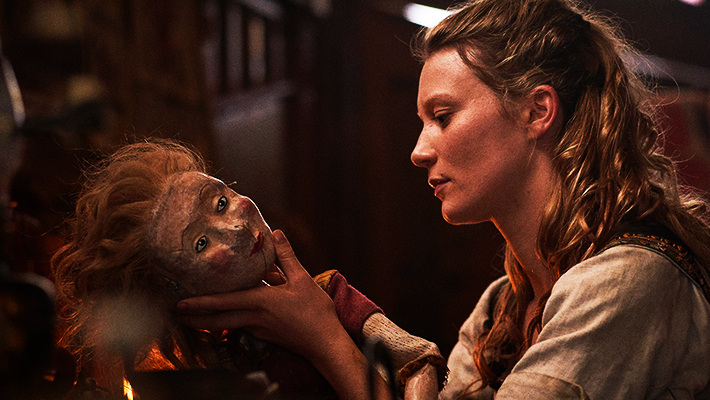
Judy And Punch is an endearingly odd, theatrically Australian take on The Witch; a Witch for people who unironically Abba, say. Or maybe it’s more like a British prestige TV take on Willow. Whatever the comparison, it’s fully realized, idiosyncratic, and tough to pigeonhole, the kind of movie that feels like it came from a far away land, and did.
Written and directed by Mirrah Foulkes, Judy comes from Blue Tongue Films, an Australian production company that has in the past given us Animal Kingdom, Hesher, War Machine, and The King, among others. This one feels like a departure from the angst and grit of those, not exactly “campy,” but certainly with an unabashed theatricality. Mia Wasikowska from Alice in Wonderland plays the titular Judy, opposite Damon Herriman (Tarantino’s Charles Manson) as Punch, puppeteers in a fictional Elizabethan-ish backwater called Seaside (which isn’t actually near the sea, but hoped to lure investors who might believe that it was). They dream of taking their puppet show to the big time, and escaping their provincial village, where the chief recreational activity is the stoning to death of heretical women.
Mostly they embody the characteristics of the marionettes they control — Judy just trying to live while being saddled with the abusive Punch. Wasikowska always seems to get cast in these fantasy stories and it’s not hard to see why. Something about her penetrating lemur gaze and delicate features just screams storybook ingenue. Herriman, meanwhile, with his jutting jaw and iguana mouth, and eyebrows that seem to have been installed upside down, trades strict realism for a theatricality so committed that it almost becomes realism again. It helps that he’s playing an entertainer, but he’s clearly working his ass off here, and it’s mesmerizing.
Judy and Punch is very much a “reimagining” of the classic(ally violent) puppet show, exploring what exactly it means for a slapstick domestic violence show (for the whole family!) to have survived for hundreds of years, while trying to rewrite its history as something more empowering. We’ve become somewhat inured to the corporate corny, female-empowerment-as-genre stories we get here, but Judy and Punch‘s version is quainter, more like Rocky Horror or Tim Burton where outcasts and goth kids matter too, gosh darn it.
That’s the pitch, anyway. Judy and Punch‘s real hook is the world itself, with colorfully baroque sets and a cast where committed veterans mingle with magnificently odd-faced characters, complete with dwarves, town drunks, and albinos. The townsfolk are scraggled, poxy, and red-cheeked, spraying spittle as they bellow at one another through a kaleidoscope of bread-mouthed Anglo-Celtic accents. While they hunt witches and stone spinsters, a matriarchal heretic camp of broad-shouldered braid-haired ladies lives happily off the grid in the woods, foraging fruit and doing tai chi in the morning fog, free from masculine tyranny. It’s hard to mix the earnest with the goofy this well, but Australians might be especially suited to it.
Punch, a vain, alcoholic abuser who hates even old people and small dogs, eventually gets his reckoning, as expected. It’s not quite the glorious crescendo we might hope, but it is just odd enough to be compelling. Judy and Punch may not be as thought-provoking as it wants to be, but what it lacks in cultural critique it more than makes up for in escapism, eccentricity, and eye candy. It’s transporting, in every sense of the word, and it comes along just when we most seem to need it.
‘Judy and Punch’ is available now on VOD. Vince Mancini is on Twitter. You can access his archive of reviews here.
